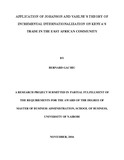| dc.description.abstract | The East African Community which Kenya is a member, seeks to widen and deepen the economic, political, social and cultural integration within the region by eliminating all barriers to the free flow of goods, services, investments and people. For decades, Kenyan companies have dominated the economic activities within the region but in recent years, the country’s dominant position appears to be weakening. Exports from Kenya to the EAC have been declining and new markets beyond EAC have not been found. The objective of this study is to determine whether the theory of incremental internationalization can be applied to explain the trend. The study adopted a descriptive survey design in which 52 members of the Kenya Association of Manufacturers were sampled. Primary data was collected using a questionnaire that was administered using drop and collect method. Secondary data from journals, periodicals, newspaper articles, websites, textbooks, working papers and circulars was also reviewed. The quantitative data obtained was analyzed using SPSS statistical software to determine means, averages, and standard deviations while qualitative data was analyzed using content analysis. The output was then presented using tables, charts, graphs, percentages and frequency distribution tables. The study found that Kenyan firms used the slow and sequential step by step approach outlined in the Uppsala Model in the EAC and that they started their internationalization process by entering psychically close markets of Uganda and Tanzania before venturing further to more distant countries. The study also found that Kenyan companies have evolved from direct exporters to active foreign based manufacturers and this could be a reason behind the decline in exports of finished goods from Kenya to East African countries. Additionally, Kenyan companies have leveraged experiential learning they have acquired to further enhance their commitment to EAC markets and strengthen their competitive positions in the continent.
Keywords: Uppsala Model, Internationalization, Regional Integration, East African Community. | en_US |



